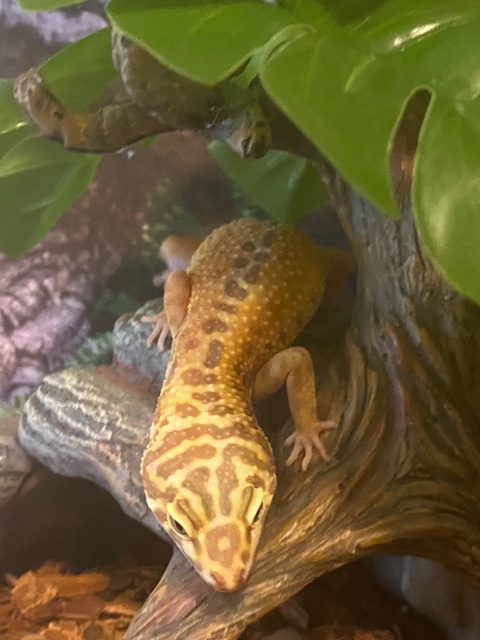Pros and Cons of Reptile Ownership
An adult female Leopard Gecko.
December 7, 2021
Reptiles. Some people love them, other people hate them. Statistically speaking about 4.5 million people own at least one reptile(s) of some kind, but why? There are clear advantages to having a lizard instead of a dog or a cat. Here are just a few.
Cost
How much does it cost to purchase a dog or cat? The average cost of a golden retriever is about $2,000 for a purebred puppy. Most reptiles top out at around $850 – $900 but that varies with location and breeder. If you get a bearded dragon from a chain retailer such as Petco, the average price is $20 – $30 dollars. Of course price varies depending on the species. Some will be more expensive, like a ball python, while others may be cheaper, like a box turtle.
Venues like the Pittsburgh Reptile Expo will also offer more exotic reptiles for intermediate prices, such as crested geckos at $200 and bearded dragons at $180.”
Size
Most reptiles stay small. The average leopard gecko maxes out at around 7 cm (4 in.) whereas an adult golden retriever gets to be about 51-56 cm (22-24 in). Larger reptiles like ball pythons get to be around 5 feet when stretched out. In the reptile world, females are always bigger than their male counterparts.
Availability
Though they may seem exotic, reptiles are just as available as any other animal on the market. PetSmart and Petco both offer a variety of reptile pet options, however, they may not be subject to the best care and could experience frequent health problems as a result.
Prospective owners who are truly interested in reptiles and have done their research should try to find a reputable breeder to support and buy from. The easiest and quickest way to find good breeders and healthy reptiles is to visit local reptile shows.
As nice as it is to have a reptile, they are just as much work as owning a dog or cat. Between humidity, temperature, tank size, and the endless amount of research you’re going to have to do, it can get overwhelming.
Here are the 3 biggest cons to reptile ownership.
Tanks
Even the smallest of reptiles need big tanks. The recommended tank size for a crested gecko, who are only 4 inches as a fully matured adult, is 4 ft. by 4ft. Bearded dragons need a minimum of 5 ft. by 5 ft. by 6 ft., and ball pythons need even bigger. The bigger the tank, the bigger the price tag, the better the brand, the higher the price.
Most people still end up making modifications to their reptile tanks because reptiles are amazing escape artists. Within the first week of having Tucker, he escaped and made a little home in the bottom of my closet. Kiwi, my brother’s 3 foot long bearded dragon made it all the way to my mom’s office in the basement before anyone noticed she had managed to pop the lid off her enclosure that we had to build because low and behold, we couldn’t find one big enough. So keep that in mind when you are thinking about purchasing a reptile.
Food
Not all reptiles eat live food, but most do. Crickets, mealworms, and different types of roaches are the most common type of insect feed to smaller reptiles. Reptiles like snakes and large lizards are going to eat bigger things like mice, rats and even rabbits. Breeds like turtles and tortoises eat mainly vegetables if you don’t want to feed live or spend extra time/money trying to find reputable powder formulas, but for almost all breeds of reptile, they eat some form of insect or small animal.
Lighting
Almost all reptiles will require some form of lighting in their enclosure. Whether it’s a UV bulb, heat lamp, basking light, or daylight bulb they’re going to need it. Now it may not seem like a big deal, but one you see the price tag on the bulb alone, all of the sudden it’s a big deal. The price goes up depending on size, wattage and availability. They are also known to burn out quickly so you’ll need multiple replacements of the same bulb.
Hopefully, this article helps you understand more about owning a reptile. While they aren’t easy work, they are definitely worth it if you’re willing to put in the time and effort required to properly care for them.













Robert Muldoon • Dec 8, 2021 at 10:22 am
this is an interesting article